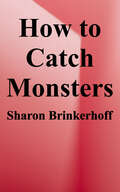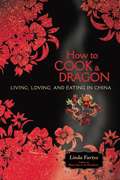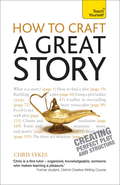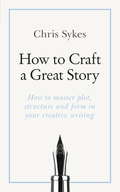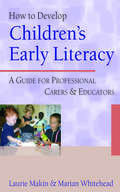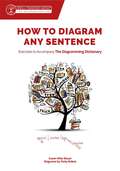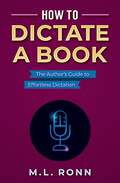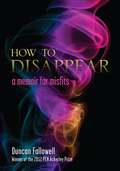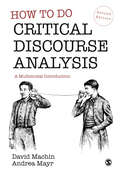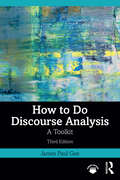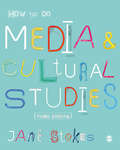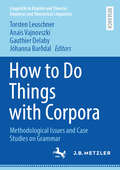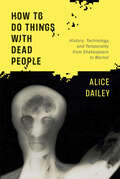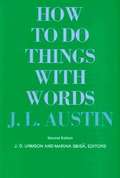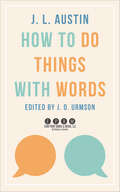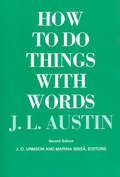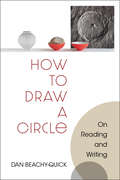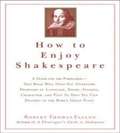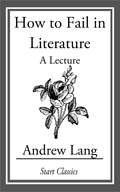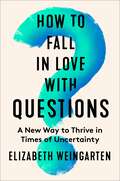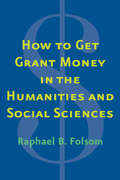- Table View
- List View
How to Catch Monsters
by Sharon BrinkerhoffThis book is a wonderful role-play reading adventure! Playbook stories are presented in a unique and colorful format and are read out loud by several readers like a play, without memorization, props, or a stage. <p><p>When you read the book, you and other readers bring the story to life and become the characters. As you read your part out loud, you will have fun expressing and acting like your character. You and the other readers will explore the story plot together and learn what will happen next. It's an exciting journey of discovery that pulls you into the story, and you'll want to read it out loud again and again! <p><p>Begin your reading adventure with the Character Summary at the beginning of the book. You'll notice right away that the words and sentences for each character appear in a different color here and throughout the book. This will make it easy to follow along and read your part with confidence and enthusiasm.
How to Cook a Dragon
by Linda FuriyaWhen Linda Furiya decided to move to China with her boyfriend at the age of thirty, she hoped to find romance and ethnic kinship. Expecting common ground with locals as an Asian American, Furiya struggled with her ambition as a food writer in a nation where notions of race and gender are set in stone. During the six years she lived in Beijing and Shanghai, Furiya experienced a wide range of experiences--loneliness, isolation, friendship, and love--tied together by one common theme: food. Ultimately, Furiya surpassed these challenges and found inspiration from the courageous Chinese women who graced her life. The sensuous experience of preparing and eating authentic Chinese cuisine follows Furiya throughout her journey, and ultimately reveals the intimate, nurturing side of the Chinese culture and people. Part insightful memoir, part authentic cookbook, How to Cook a Dragon is a revealing look at race, love, and food in China.
How to Craft a Great Story: Teach Yourself
by Chris SykesHow to Craft a Great Story takes you step by step through the process of creating a compelling and coherent plot and structure. It covers such basics as the traditional story arcs, and such advanced information as finding balance and marrying structure and form. Each chapter contains a diagnostic test, case studies, practical exercises and Aide Memoire boxes. Each chapter concludes with a reminder of the key points of the chapter (Focus Points) and a round-up of what to expect in the next (Next Step) will whet your appetite for what's coming and how it relates to what you've just read. Covering some of the most commonly raised questions in creative writing courses, it is perfect for anyone who needs the next step on from the basic 'how to write a novel'.
How to Craft a Great Story: Teach Yourself Creating Perfect Plot and Structure
by Chris SykesLEARN HOW TO PLOT AND STRUCTURE YOUR CREATIVE WRITING.How to Craft a Great Story takes you step by step through the process of creating a compelling and coherent plot and structure. It covers such basics as the traditional story arcs, and such advanced information as finding balance and marrying structure and form. Each chapter contains a diagnostic test, case studies, practical exercises and Aide Memoire boxes. Each chapter concludes with a reminder of the key points of the chapter (Focus Points) and a round-up of what to expect in the next (Next Step) will whet your appetite for what's coming and how it relates to what you've just read. Covering some of the most commonly raised questions in creative writing courses, it is perfect for anyone who needs the next step on from the basic 'how to write a novel'.ABOUT THE SERIESThe Teach Yourself Creative Writing series helps aspiring authors tell their story. Covering a range of genres from science fiction and romantic novels, to illustrated children's books and comedy, this series is packed with advice, exercises and tips for unlocking creativity and improving your writing. And because we know how daunting the blank page can be, we set up the Just Write online community at tyjustwrite, for budding authors and successful writers to connect and share.
How to Develop Children's Early Literacy: A Guide for Professional Carers and Educators
by Dr Marian R Whitehead Ms Laurie Makin`Laurie Makin's and Marian Whitehead's book on How to Develop Children's Literacy stands out from the usual guides on child development and learning. The language is accessible and engaging. The text is empowering rather than condescending in tone and in content. Teacher trainees and people working with children, including parents, who are wanting a good depth of information quickly about children's early literacy development will find this book provides it' - Childforum, New Zealand Are you studying for a vocational qualification in early childhood? Are you a qualified teacher working with under-fives for the first time? Are you a nursery nurse or teaching assistant? Or are you thinking about doing one of these things? If so, this book is for you. The years before a child starts school are crucial in establishing strong foundations for literacy. This book addresses current issues relating to early literacy. The authors offer pragmatic ideas and information on key areas including: } literacy for babies and toddlers } literacy for preschool, daycare and nursery children } play, bilingualism, special needs and official curriculum frameworks. How to Develop Children's Early Literacy is a practical guide designed to support all early literacy educators.
How to Diagram Any Sentence: Exercises To Accompany The Diagramming Dictionary (Grammar for the Well-Trained Mind #0)
by Susan Wise Bauer Patty RebneDiagram over 100 sentences by masters of the English language, and learn how to analyze and understand clear, effective writing. (Using this book requires The Diagramming Dictionary, which explains each rule.) Diagramming a sentence shows you how it is (or isn't) working, and unlocks the door to clear, balanced writing. These exercises by grammar experts Susan Wise Bauer and Jessica Otto use sentences by classic and contemporary authors to give students practice in every diagramming rule covered in The Diagramming Dictionary, from the simplest noun-verb sentences to challenging, complex pieces from Dickens and Austen.Full answers are provided at the back of the book.How to Diagram Any Sentence is the perfect skill-building practice book for anyone who wants to communicate with clarity and precision. (Using this book requires The Diagramming Dictionary, which explains each rule that is practiced in How to Diagram Any Sentence.)
How to Dictate a Book: The Author's Guide to Effortless Dictation (Author Level Up #14)
by M.L. RonnHave you heard that dictation supercharges your word counts, but are you frustrated with it? You're not alone. Many writers attempt dictation, only to quit because it doesn't get them the results they hear so much about. Fortunately, there is a way to do it correctly. If you've ever worried about "sounding funny", struggled with what to say when you’re behind the mic, or gotten tired of making a kajillion spelling mistakes with Dragon, then you've come to the right place. In this writer's guide, prolific author M.L. Ronn will teach you how to unlock the power of dictation using the methods he's used to dictate over 30 books of fiction & nonfiction. You'll learn: How to dictate (and why you should) The tools and equipment you'll need How to set Dragon up for success The 3 types of dictation (the 2nd one will blow your mind) How to dictate cleanly the first time so that you don't have to spend as much time editing And more This book also comes with a video companion course where you can see the author dictate sections from this very book. Watch along as you read or watch the course first and then return to the text for more nuance. (No email address required. Just click and enjoy). If you're ready to become a dictation master, then click the buy button and speak your way to writing nirvana! V2.0
How to Disappear
by Duncan FallowellWinner of the 2012 PEN Ackerley Prize Duncan Fallowell sets out to odd corners of the world in pursuit of some extraordinary and improbable characters who were in most cases momentarily famous—or infamous—and then simply disappeared. The first to disappear is the author himself—to a ghostly hotel on a Mediterranean island. His subjects, though unmet or hardly met, live for the reader with remarkable vividness, such as the German artist who bought a large island in the Hebrides and vanished immediately afterward, to the astonishment of its inhabitants. Fallowell tracks down the recluse who inspired Evelyn Waugh's creation Sebastian Flyte, the legendary love object of Waugh's novel Brideshead Revisited, who wants both to forget the past and to cling to it. He even pursues the ultimate disappearance—the death of Princess Diana—and the miasma of shock, wonder, and grief that followed, writing "Mystification is absolutely essential to our feeling of being alive. " In these highly original adventures, How to Disappear winds through the eerie abyss that can open up between someone—or something—being both real and phantom.
How to Do Critical Discourse Analysis: A Multimodal Introduction
by David Machin Andrea MayrWant to use Critical Discourse Analysis, but not sure where to start? This book is the complete toolkit you need. Each chapter presents distinct concepts and ideas in Critical Discourse Analysis, explaining how to use them in your research – and why. Packed with case studies of news texts, social media content, memes, promotional videos, institutional documents, infographics and webpages, the book shows you how to apply each set of tools to real life examples. Most importantly, examples, case studies, and revised opening chapters of this second edition show how multimodal Critical Discourse Analysis can help us to understand the role of language in the functioning of society and politics today, shaping our priorities for what to do and how to act. This book is an inspiring and valuable resource for any undergraduate students and researchers who wish to understand and use Critical Discourse Analysis. David Machin is Professor of Linguistics at Shanghai International Studies University. Andrea Mayr is an Associate Professor at Zayed University.
How to Do Critical Discourse Analysis: A Multimodal Introduction
by David Machin Andrea MayrWant to use Critical Discourse Analysis, but not sure where to start? This book is the complete toolkit you need. Each chapter presents distinct concepts and ideas in Critical Discourse Analysis, explaining how to use them in your research – and why. Packed with case studies of news texts, social media content, memes, promotional videos, institutional documents, infographics and webpages, the book shows you how to apply each set of tools to real life examples. Most importantly, examples, case studies, and revised opening chapters of this second edition show how multimodal Critical Discourse Analysis can help us to understand the role of language in the functioning of society and politics today, shaping our priorities for what to do and how to act. This book is an inspiring and valuable resource for any undergraduate students and researchers who wish to understand and use Critical Discourse Analysis. David Machin is Professor of Linguistics at Shanghai International Studies University. Andrea Mayr is an Associate Professor at Zayed University.
How to Do Discourse Analysis: A Toolkit
by James Paul GeeHow to Do Discourse Analysis provides a comprehensive toolkit for conducting discourse analysis, offering 26 practical tools to examine how language is used to construct meaning, enact identities, and shape social realities. Written by renowned linguist James Paul Gee, it introduces key concepts like situated meanings, social languages, and Discourses, showing how language both reflects and creates social contexts.This essential textbook takes readers through a step-by-step process of analyzing texts and talk, from examining grammar and vocabulary to uncovering underlying ideologies and power dynamics. It covers a wide range of discourse types, from everyday conversations to political speeches and social media posts. Gee draws on diverse examples from education, politics, media, and popular culture to illustrate the tools in action.While grounded in linguistic theory, the book emphasizes hands-on application. Each tool is accompanied by sample analyses and practice exercises. This new edition incorporates recent developments in digital communication and updates examples for contemporary relevance, making it an ideal resource for advanced undergraduate and postgraduate students working in the areas of applied linguistics, education, psychology, anthropology, and communication.
How to Do Media and Cultural Studies
by Jane StokesA favourite with both students and lecturers, How to Do Media and Cultural Studies provides readers with all the knowledge and practical expertise they need to carry out their project or dissertation. Giving them hands-on guidance on managing the whole process, Jane Stokes: Shows students how to identify a topic and create a research question Guides them through the research process, from getting started through to writing-up Explores a range a case studies, showing how methods have been applied by others Expanded and updated throughout, this 3rd edition now includes: Increased coverage of digital media, social media and internet research More practical exercises to help you tie media and cultural theory to your work New guidance on understanding research ethics New guidance on mixing and combining methods How to Do Media and Cultural Studies has inspired thousands of students and researchers to understand why studying media texts, industries and audiences is so important. It is an ideal companion for anyone conducting a research project.
How to Do Media and Cultural Studies
by Jane StokesA favourite with both students and lecturers, How to Do Media and Cultural Studies provides readers with all the knowledge and practical expertise they need to carry out their project or dissertation. Giving them hands-on guidance on managing the whole process, Jane Stokes: Shows students how to identify a topic and create a research question Guides them through the research process, from getting started through to writing-up Explores a range a case studies, showing how methods have been applied by others Expanded and updated throughout, this 3rd edition now includes: Increased coverage of digital media, social media and internet research More practical exercises to help you tie media and cultural theory to your work New guidance on understanding research ethics New guidance on mixing and combining methods How to Do Media and Cultural Studies has inspired thousands of students and researchers to understand why studying media texts, industries and audiences is so important. It is an ideal companion for anyone conducting a research project.
How to Do Things with Books in Victorian Britain
by Leah PriceHow to Do Things with Books in Victorian Britain asks how our culture came to frown on using books for any purpose other than reading. When did the coffee-table book become an object of scorn? Why did law courts forbid witnesses to kiss the Bible? What made Victorian cartoonists mock commuters who hid behind the newspaper, ladies who matched their books' binding to their dress, and servants who reduced newspapers to fish 'n' chips wrap? Shedding new light on novels by Thackeray, Dickens, the Brontës, Trollope, and Collins, as well as the urban sociology of Henry Mayhew, Leah Price also uncovers the lives and afterlives of anonymous religious tracts and household manuals. From knickknacks to wastepaper, books mattered to the Victorians in ways that cannot be explained by their printed content alone. And whether displayed, defaced, exchanged, or discarded, printed matter participated, and still participates, in a range of transactions that stretches far beyond reading. Supplementing close readings with a sensitive reconstruction of how Victorians thought and felt about books, Price offers a new model for integrating literary theory with cultural history. How to Do Things with Books in Victorian Britain reshapes our understanding of the interplay between words and objects in the nineteenth century and beyond.
How to Do Things with Corpora: Methodological Issues and Case Studies on Grammar (Linguistik in Empirie und Theorie/Empirical and Theoretical Linguistics)
by Torsten Leuschner Anaïs Vajnovszki Gauthier Delaby Jóhanna BarðdalAlong with a renewed interest in the empirical foundations of linguistics, the increasing accessibility of large-scale corpora has sparked a surge of corpus-linguistic work on the grammar of natural languages. Corpus-based methods enhance our knowledge and understanding of individual languages, and they are theoretically significant because they allow us to test complex hypotheses on empirical and reproducible data. Spread over six thematic sections, the fifteen case studies in this book reflect on how methodological challenges and decisions affect the corpus-based analysis of grammatical patterns. They cover a wide variety of phenomena (syntax, registers, learner language, morphology, productivity, multilingualism) under different frameworks, including construction grammar, discourse analysis, and generative grammar. The contributors discuss the respective methodological and theoretical issues, proposing innovative solutions for linguistics in the 21st century.
How to Do Things with Dead People: History, Technology, and Temporality from Shakespeare to Warhol
by Alice DaileyHow to Do Things with Dead People studies human contrivances for representing and relating to the dead. Alice Dailey takes as her principal objects of inquiry Shakespeare's English history plays, describing them as reproductive mechanisms by which living replicas of dead historical figures are regenerated in the present and re-killed. Considering the plays in these terms exposes their affinity with a transhistorical array of technologies for producing, reproducing, and interacting with dead things—technologies such as literary doppelgängers, photography, ventriloquist puppetry, X-ray imaging, glitch art, capital punishment machines, and cloning. By situating Shakespeare's historical drama in this intermedial conversation, Dailey challenges conventional assumptions about what constitutes the context of a work of art and contests foundational models of linear temporality that inform long-standing conceptions of historical periodization and teleological order. Working from an eclectic body of theories, pictures, and machines that transcend time and media, Dailey composes a searching exploration of how the living use the dead to think back and look forward, to rule, to love, to wish and create.
How to Do Things with Forms: The Oulipo and Its Inventions
by Chris AndrewsThe Oulipo (Ouvroir de littérature potentielle, or Workshop for Potential Literature) is a literary think tank that brings together writers and mathematicians. Since 1960, its worldwide influence has refreshed ways of making and thinking about literature.How to Do Things with Forms assesses the work of the group, explores where it came from, and envisages its future. Redefining the Oulipo’s key concept of the constraint in a clear and rigorous way, Chris Andrews weighs the roles of craft and imitation in the group’s practice. He highlights the importance of translation for the Oulipo’s writers, explaining how their new forms convey meanings and how these famously playful authors are also moved by serious concerns. Offering fresh interpretations of emblematic Oulipian works such as Georges Perec’s Life: A User’s Manual, Andrews also examines lesser-known texts by Jacques Roubaud, Anne F. Garréta, and Michelle Grangaud.How to Do Things with Forms addresses questions of interest to anyone involved in the making of literature, illuminating how writers decide when to stop revising, the risks and benefits of a project mentality in creative writing, and ways of holding a reader’s interest for as long as possible.
How to Do Things with Words
by J. L. Austin J. O. Urmson Marina SbisàJohn L. Austin was one of the leading philosophers of the twentieth century. The William James Lectures presented Austin's conclusions in the field to which he directed his main efforts on a wide variety of philosophical problems. These talks became the classic How to Do Things with Words
How to Do Things with Words
by J. L. AustinIn this seminal series of lectures by the noted British philosopher, J.L. Austin explores the profound ways in which language is not just a vehicle for conveying information but also a tool for performing actions. He introduces the concept of the performative utterance -- later called dubbed a speech-act -- which are utterances that not only convey meaning but also have the power to bring about changes in the world. The book also delves into the complexities of language, meaning, and context, highlighting how linguistic conventions and social norms shape our understanding of words. Austin's work challenges conventional views on language, emphasizing that words have the power to do things and not just describe things.
How to Do Things with Words: Second Edition (Oxford Paperbacks Ser. #1)
by J. L. AustinJohn L. Austin was one of the leading philosophers of the twentieth century. The William James Lectures presented Austin’s conclusions in the field to which he directed his main efforts on a wide variety of philosophical problems. These talks became the classic How to Do Things with Words. For this second edition, the editors have returned to Austin’s original lecture notes, amending the printed text where it seemed necessary. Students will find the new text clearer, and, at the same time, more faithful to the actual lectures. An appendix contains literal transcriptions of a number of marginal notes made by Austin but not included in the text. Comparison of the text with these annotations provides new dimensions to the study of Austin’s work.
How to Draw a Circle: On Reading and Writing (Poets On Poetry)
by Dan Beachy-QuickWhat is it to write a poem? What work do words do when placed with care and vision into the intensely charged space of poetic effort? How to Draw a Circle does not seek to answer those questions, but to encounter them as fully and honestly as one can. The thread running through the essays is an ongoing investigation into poetry as an epistemological experiment, one which binds the imagination to the worldly, and trusts that creative endeavor is a form of participation in the ongoing creation of the world. It does so in part by focusing on thinkers, poets, writers, and literary movements where such thinking for a while prevailed, from Socrates to Melville, Mythology to Romanticism. Here the poem is approached as something deeply rooted in human consciousness, done so not to make an atavistic claim about poetry's history, but to show the ways in which oldest tradition gives us ever-new eyes. The hope this book gathers around is that poetry—poetic expression, the wild wonder of working in words—turns us back toward the world in more vibrant, more open, more ethical ways. How to Draw a Circle summons lyric powers—not an argument, but a participation in the ways poetry works in us and on us.
How to Enjoy Shakespeare
by Robert Thomas FallonIn How to Enjoy Shakespeare, the author explores Shakespeare's familiarity in five sections dealing with language, theme, staging, character, and plot, each abundantly illustrated with episodes and quotations from the plays.
How to Fail in Literature: A Lecture
by Andrew LangAndrew Lang (1844-1912) was a prolific Scots man of letters, a poet, novelist, literary critic and contributor to anthropology. He now is best known as the collector of folk and fairy tales. He was educated at the Edinburgh Academy, St Andrews University and at Balliol College, Oxford. As a journalist, poet, critic and historian, he soon made a reputation as one of the ablest and most versatile writers of the day. Lang was one of the founders of the study of "Psychical Research," and his other writings on anthropology include The Book of Dreams and Ghosts (1897), Magic and Religion (1901) and The Secret of the Totem (1905). He was a Homeric scholar of conservative views. Other works include Homer and the Epic (1893); a prose translation of The Homeric Hymns (1899), with literary and mythological essays in which he draws parallels between Greek myths and other mythologies; and Homer and his Age (1906). He also wrote Ballades in Blue China (1880) and Rhymes la Mode (1884).
How to Fall in Love with Questions: A New Way to Thrive in Times of Uncertainty
by Elizabeth WeingartenJournalist and applied behavioral scientist Elizabeth Weingarten charts a new path to embrace the questions of our lives instead of seeking fast, easy answers.What do you do when faced with a big, important question that keeps you up at night? Many people, understandably, seize answers dispensed by “experts,” influencers, gurus, and more. But these fast, easy, one-size-fits-all solutions often fail to satisfy, and can even cause more pain.What if our questions—the ones we ask about relationships, work, meaning, identity, and purpose—are not our tormentors, but our teachers? Inspired by 150-year-old advice from Austrian poet Rainer Maria Rilke and backed by contemporary science, Elizabeth Weingarten offers a fresh approach for dealing with these seemingly unsolvable questions. In her quest, Weingarten shares her own journey and the stories of many others, whose lives have transformed through a different, and better, relationship with uncertainty.Designed to inspire anyone who feels stuck, powerless, and drained, How to Fall in Love with Questions challenges us to unlock our minds and embark on the kind of self-discovery that’s only possible when we feel most alive—that is, when we don’t know what will happen next.
How to Get Grant Money in the Humanities and Social Sciences
by Raphael Brewster FolsomA valuable and engaging guide to applying for—and getting—grants in the humanities and social sciences Scholars in the humanities and social sciences need money to do research. This book shows them how to get it. In this accessible volume, Raphael Folsom shares proven strategies in a series of short, witty chapters. It features tips on how graduate students, postdocs, and young faculty members can present themselves and their work in the best possible light. The book covers the basics of the grant-writing process, including finding a mentor, organizing a writing workshop, conceptualizing the project on a larger scale, and tailoring an application for specific submissions. The book includes interviews with nine of the most respected scholars in the country, each of whom has evaluated thousands of grant applications. The first authoritative book on the subject, Folsom's indispensable work will become a must-have resource for years to come.
